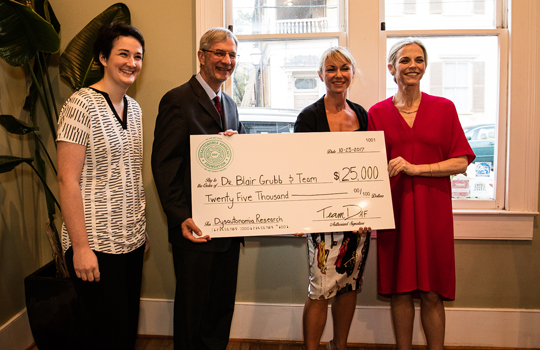Recognized as one of the world’s leading authorities on syncope and disorders of the autonomic nervous system, Dr. Blair Grubb, UT Distinguished University Professor of Medicine and director of the Clinical Electrophysiology Program, recently was honored for his groundbreaking work in dysautonomia research.
Dysautonomia describes a group of diseases in which the autonomic nervous system does not work properly, affecting the heart, bladder, intestines, and other organs and blood vessels.

Dr. Blair Grubb received a $25,000 award from the Dysautonomia Advocacy Foundation last week. Posing for a photo with the physician were, from left, Kaylee Sills, acting executive director of the Dysautonomia Advocacy Foundation; Sarah Glenn Smith, president of the Dysautonomia Advocacy Foundation; and Ainsley Glenn, founding director of the Dysautonomia Advocacy Foundation.
“We presented Dr. Grubb with $5,000 last year, and we are so impressed with his progress in groundbreaking research into the role of autoimmunity in the pathogenesis of postural orthostatic tachycardia syndrome (POTS), we decided to quintuple our gift this year,” said Sarah Glenn Smith, president of the association’s board.
Postural orthostatic tachycardia syndrome, known as POTS, is a form of dysautonomia and the condition characterized by an inappropriate elevation in heart rate and drop in blood pressure when standing up that can cause lightheadedness and palpitations.
“We see people from all over the world with varying levels of disability due to these diseases. We are working hard to determine what causes dysautonomia so we can improve their lives,” Grubb said. “This funding will help us to continue our exploration of dysautonomia as an autoimmune disease.”
Grubb pioneered many of the diagnostic and treatment modalities that are in common use for these disorders today and has authored more than 240 scientific papers, as well as five books and 35 book chapters.
He was recognized as one of “America’s Top Doctors” for 12 years in a row and received UT’s Distinguished University Professor award in 2009 and 2015. He was named Dysautonomia International’s Physician of the Year in 2015 and the Medical Professional of the Decade by the British Heart Rhythm Society and Arrhythmia Alliance in 2015.
While in South Carolina, Grubb also presented a lecture, “Autonomic Disorders: A Guide for the Clinician,” at the Medical University of South Carolina’s Grand Rounds Continuing Medical Education.
A research fund has been established to support Grubb’s mission to care for patients impacted by this condition. Visit https://give2ut.utoledo.edu/grubb.asp to make a donation. For more information, contact Allie Berns, assistant director of annual giving programs, at 419.530.5414 or allison.berns@utoledo.edu.